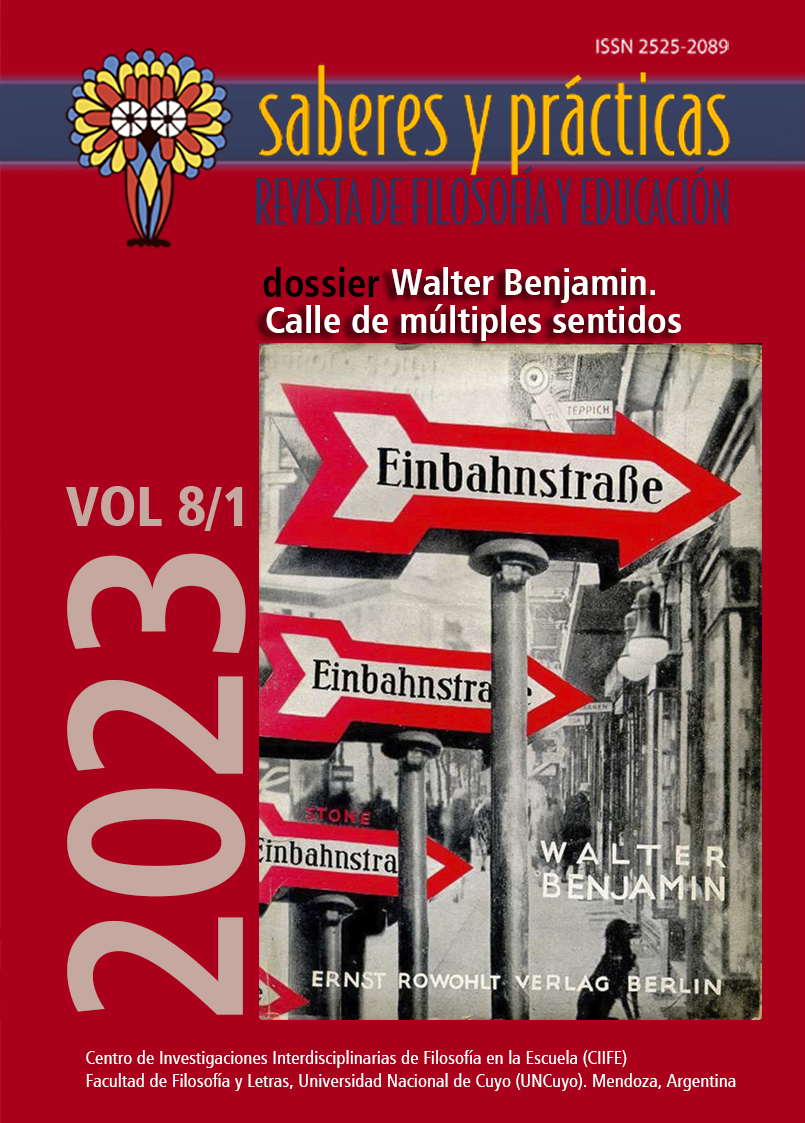Against the formalization of suffering: marginal “actuality” of Benjamin's philosophy
DOI:
https://doi.org/10.48162/rev.36.103Keywords:
criticism, suffering, coloniality, actuality, Walter BenjaminAbstract
This work resumes and continues the question about the relevance of Walter Benjamin's philosophy. For this, the exploration of certain epistemological and political guidelines that determine his conception of criticism is prioritized (and not the aesthetic, anthropological and/or cultural enclaves). It is affirmed as a starting point that in the thought of Benjamin the suffering can be identified as the origin of a critical epistemology. From this, it is argued that Benjamin's conception of criticism depends on his conception of history. Then, it tries to indicate that criticism is an expression of the experience of suffering and, at the same time, the vivification of the weak messianic voice of the dead. Finally, the update and actuality here and now of the Benjaminian criticism is investigated: it is argued that the philosophy that puts coloniality at the center as a marginal configuration of suffering allows critical theory to be updated to the extent that it avoids the formalization of such a concept.
Downloads
References
Adorno, Th. (2003). Introducción a los Escritos de Benjamin. En Notas sobre literatura. Akal.
Benjamin, W. (2001). Sobre el programa de la filosofía venidera. En Iluminaciones IV. Taurus.
Benjamin, W. (2005). Libro de los Pasajes. Akal.
Benjamin, W. (2006). Sobre el concepto de historia. En M. Reyes Mate (trad.), Medianoche en la historia. Trotta.
Benjamin, W. (2007). El Surrealismo. La última instantánea de la inteligencia europea. En Obras II/1. Abada.
Benjamin, W. (2012). Origen del Trauerspiel alemán. Gorla.
Echeverría, B. (1986). El discurso crítico de Marx. Era.
Echeverría, B. (1997). Benjamin: mesianismo y utopía. En Baca Olamendi, L. y Cisneros, I.
(comps.), Los intelectuales y los dilemas políticos en el siglo XX Tomo I. Triana Editores. http://bolivare.unam.mx/ensayos/benjamin_mesianismo_y_utopia
Fraser, N. (2023). Capitalismo caníbal. Siglo XXI.
Gandarilla Salgado, J. (2014). Modernidad, crisis y crítica. La Cebra.
Grüner, E. (2010). La oscuridad y las luces. Capitalismo, cultura y revolución. Edhasa.
Moreno, M. R. (2020). Entre el atraso y el aplazamiento: aproximaciones a un régimen epistemológico de las postergaciones, en De Oto, Alejandro (comp.), Ejercicios sobre lo postergado: escritos poscoloniales. Qellqasqa.
Moreno, M. R. (2021). Límites que discurren como umbrales: Walter Benjamin y la crítica de la razón moderna. Griot: Revista de Filosofia, [S. l.] 21(2), pp. 132–147, 2021. DOI: https://doi.org/10.31977/grirfi.v21i2.2379
Quijano, A. (2007). Colonialidad del poder y clasificación social. En S. Castro-Gómez y R. Grosfoguel (comps.), El giro decolonial: reflexiones para una diversidad epistémica más allá del capitalismo global. Siglo del Hombre, Universidad Central, Instituto de Estudios Sociales Contemporáneos y Pontificia Universidad Javeriana, Instituto Pensar.
Quijano, A. (2011). Colonialidad del poder, eurocentrismo y América Latina. En E. Lander (comp.), La colonialidad del
saber: eurocentrismo y ciencias sociales. Perspectivas latinoamericanas. CLACSO.
Restrepo, E. y Rojas, A. (2010). Inflexión decolonial: fuentes, conceptos y cuestionamientos. Universidad del Cauca.
Reyes Mate, M. (2006). Medianoche en la historia. Comentarios a las tesis de Walter Benjamin “Sobre el concepto de historia”. Trotta.
Weber, Th. (2014). Experiencia. En E. Wizisla y M. Opitz (eds.), Conceptos de Walter Benjamin. Las Cuarenta.
Published
How to Cite
Issue
Section
License
Copyright (c) 2023 María Rita Moreno
This work is licensed under a Creative Commons Attribution-NonCommercial-ShareAlike 2.5 Argentina License.









